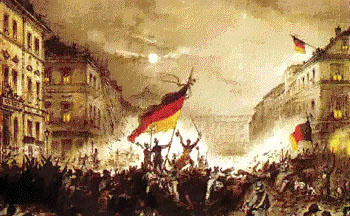

Karl May's Winnetou (1893)
American Progress by John Gast (1872)
Les Troyens (1863) by Hector Berlioz
Walt Whitman's Leaves of Grass (1855)

Herman Melville's Moby-Dick (1851)


the February revolution in France (1848)

Walden (1845-1847)
Ralph Waldo Emerson's Nature (1836)
Felix Mendelssohn's Italian Symphony (1833)

Victor Hugo's Hunchback of Notre Dame (1831)
Heinrich Heine left Germany for Paris (1831)

the July Revolution (1830)

Eichendorff's Aus dem Leben eines Taugenichts (1826)
_printed_1838.jpg)
Robert Owen established a communal village based on cooperative ideals (1825) in New Harmony, Indiana

the Leatherstocking Tales (1823-1841)
Henri de Saint-Simon's Du système industriel (1821) helped found socialism

Mary Shelley's Frankenstein (1818)

the Eroica (1805)
François-René de Chateaubriand's Génie du christianisme (1802)
Waltz (1800)
Romanticism (1800-1850) in its artistic, political, philosophical and social aspects was in part
inspired by the revolts against aristocratic social and political norms of the late 18th century,
which found their romantic reenactment for example in the French Revolution of 1830, also known as
the July Revolution. It was a revolt by the middle class against Bourbon King Charles X which forced
him out of office and replaced him with the Orleanist King Louis-Philippe. Romanticism as an artistic
discipline was eventually replaced by naturalism and social realism towards the end of the 19th century
Friedrich von Schlegel's Athenäum (1798)
Coleridge and Wordsworth' Lyrical Ballads (1798)
Sturm und Drang (1765-1795)